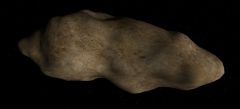Difference between revisions of "1620 Geographos"
(→Geographos in Orbiter: Added content.) |
(Added content.) |
||
| Line 2: | Line 2: | ||
!bgcolor="lightsteelblue" colspan="2" align="center" |1620 Geographos | !bgcolor="lightsteelblue" colspan="2" align="center" |1620 Geographos | ||
|- | |- | ||
| − | |colspan="2" align="center"|[[Image: | + | |colspan="2" align="center"|[[Image:Geographos-AsteroidPackv1zip-Orbiter2003P2.jpg|240px]] |
|- | |- | ||
| − | |colspan="2" align="center"|'''Geographos in Orbiter''' | + | |colspan="2" align="center"|'''1620 Geographos from ''AsteroidPack_v1.00.zip'' in Orbiter 2003P2''' |
|- | |- | ||
!bgcolor="lightsteelblue" colspan="2"|Designation | !bgcolor="lightsteelblue" colspan="2"|Designation | ||
| Line 18: | Line 18: | ||
|width="30%"|Epoch||align="right" width="50%"|2006 | |width="30%"|Epoch||align="right" width="50%"|2006 | ||
|- | |- | ||
| − | |width="30%"|Semimajor axis (a)||align="right" width="50%"| 186315638173 | + | |width="30%"|Semimajor axis (a)||align="right" width="50%"| 186315638173.388 m<br>(1.24544311568598 AU) |
|- | |- | ||
|width="30%"|Eccentricity (e)||align="right" width="30%"| 0.335415102834536 | |width="30%"|Eccentricity (e)||align="right" width="30%"| 0.335415102834536 | ||
| Line 53: | Line 53: | ||
|} | |} | ||
| − | |||
| − | |||
| − | |||
| − | |||
| − | |||
| − | |||
'''1620 Geographos''' is a Near-Earth object discovered in 1951 by [[w:Albert George Wilson|Albert George Wilson]] and [[w:Rudolph Minkowski]] at [[w:Palomar Observatory|Palomar]] and is named in honor of the [[w:National Geographic Society]]. | '''1620 Geographos''' is a Near-Earth object discovered in 1951 by [[w:Albert George Wilson|Albert George Wilson]] and [[w:Rudolph Minkowski]] at [[w:Palomar Observatory|Palomar]] and is named in honor of the [[w:National Geographic Society]]. | ||
| − | Geographos was to be visited by the [[w:Clementine mission]], failed to reach the body. | + | Geographos was to be visited by the [[w:Clementine mission]], but it failed to reach the body. |
== Geographos in Orbiter == | == Geographos in Orbiter == | ||
1620 Geographos was modeled in Orbiter as a somewhat potato shaped object about 5 km on the longest dimension. Because the visual surface of Geographos is well below the hard radius of the body, landing anywhere on the body's radius you end up well above the visual surface. Because even at the surface, geographos only provides 1% of the local gravity, the [[Sun]] providing the other 99%, a ship cannot orbit Geographos, it can only fly along with it in solar orbit, maneuvering in its vicinity. A ship also cannot land and remain on the hard surface, it will immediately drift off the surface. When maneuvering in the vicinity, have SurfaceMFD up so that the pilot can monitor the ship's altitude above the surface. | 1620 Geographos was modeled in Orbiter as a somewhat potato shaped object about 5 km on the longest dimension. Because the visual surface of Geographos is well below the hard radius of the body, landing anywhere on the body's radius you end up well above the visual surface. Because even at the surface, geographos only provides 1% of the local gravity, the [[Sun]] providing the other 99%, a ship cannot orbit Geographos, it can only fly along with it in solar orbit, maneuvering in its vicinity. A ship also cannot land and remain on the hard surface, it will immediately drift off the surface. When maneuvering in the vicinity, have SurfaceMFD up so that the pilot can monitor the ship's altitude above the surface. | ||
| + | |||
| + | {| class="wikitable" style="text-align: center" | ||
| + | |colspan="8"|<center>'''Orbiter versions and add-ons which include 1620 Geographos'''</center> | ||
| + | |- | ||
| + | !Add-on!!Source!!Version!!Author!!Type!!Release Date!!Compatibility!!Wiki article | ||
| + | |- | ||
| + | |[https://www.orbiter-forum.com/resources/asteroid-pack-1-00.2832/ Asteroid Pack 1.00]||O-F Resources||2004-11-21||Nighthawke||Scenery||21 November 2004|||| | ||
| + | |} | ||
| + | |||
== Gallery == | == Gallery == | ||
<gallery widths="200" heights="200"> | <gallery widths="200" heights="200"> | ||
| + | Geographos-AsteroidPackv1zip-Orbiter2003P2.jpg|<center>1620 Geographos from ''AsteroidPack_v1.00.zip'' in Orbiter 2003P2</center> | ||
| + | 1620Geographos (Lightcurve Inversion).png|<center>3D model of 1620 Geographos based on light-curve model<br>from Wikimedia Commons</center> | ||
Animation_of_1620_Geographos_orbit.gif|Animation of the orbit of Geographos as compared to [[Venus]], [[Earth]] and [[Mars]] from 2010 to 2020.<br>From Wikimedia Commons. | Animation_of_1620_Geographos_orbit.gif|Animation of the orbit of Geographos as compared to [[Venus]], [[Earth]] and [[Mars]] from 2010 to 2020.<br>From Wikimedia Commons. | ||
</gallery> | </gallery> | ||
Revision as of 03:06, 12 September 2024
1620 Geographos is a Near-Earth object discovered in 1951 by Albert George Wilson and w:Rudolph Minkowski at Palomar and is named in honor of the w:National Geographic Society.
Geographos was to be visited by the w:Clementine mission, but it failed to reach the body.
Geographos in Orbiter
1620 Geographos was modeled in Orbiter as a somewhat potato shaped object about 5 km on the longest dimension. Because the visual surface of Geographos is well below the hard radius of the body, landing anywhere on the body's radius you end up well above the visual surface. Because even at the surface, geographos only provides 1% of the local gravity, the Sun providing the other 99%, a ship cannot orbit Geographos, it can only fly along with it in solar orbit, maneuvering in its vicinity. A ship also cannot land and remain on the hard surface, it will immediately drift off the surface. When maneuvering in the vicinity, have SurfaceMFD up so that the pilot can monitor the ship's altitude above the surface.
| Add-on | Source | Version | Author | Type | Release Date | Compatibility | Wiki article |
|---|---|---|---|---|---|---|---|
| Asteroid Pack 1.00 | O-F Resources | 2004-11-21 | Nighthawke | Scenery | 21 November 2004 | ||
Gallery
| edit The Solar System | |
|---|---|
| Central star |
Sun (Sol) |
| Planets |
Mercury - Venus - Earth - Mars - Jupiter - Saturn - Uranus - Neptune |
| Natural satellites |
Moon - Phobos - Deimos - Io - Europa - Ganymede - Titan - more... |
| Add-ons |
Planets - Dwarf Planets - Small objects - Natural satellites - Alternative star systems |



